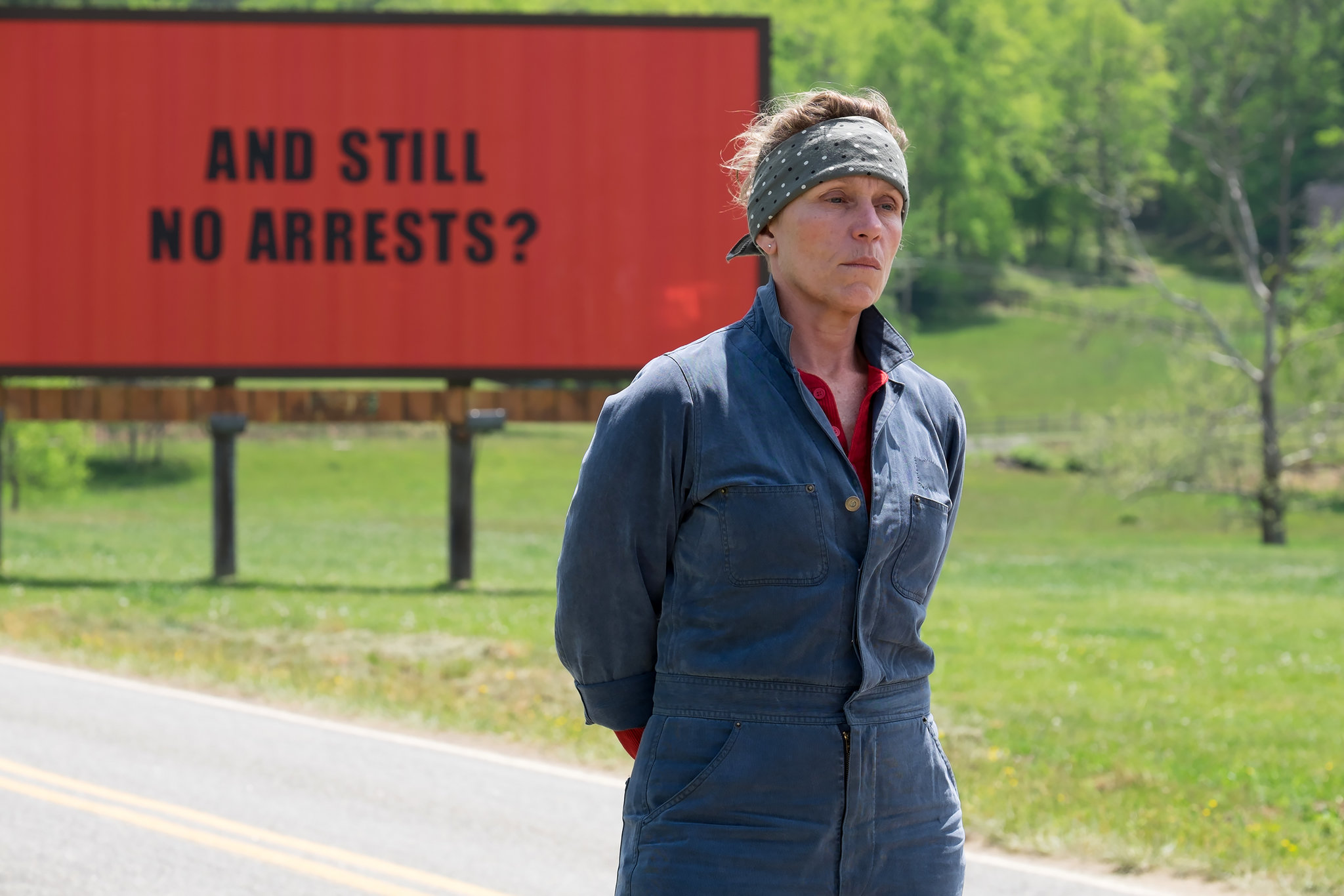Frances McDormand gives an uncompromising performance in Martin McDonough’s blistering Three Billboards Outside Ebbing, Missouri, a corrosive battle cry of a movie that taps into dual rages—the primal pain of a parent mourning the death of a child and a rising antipathy against incompetent police. It is a movie of immense force disguised as, at times, a black comedy, and one that combines caustic humor with an examination of right, wrong and the area between when a small town is divided and its police exposed as brutally incompetent, racist, or both.
McDormand is Mildred Hayes, a divorced Missouri mother bearing the trauma of the rape and murder of her daughter. After a year the case has gone cold, the police apathetic and Mildred herself bitter about law enforcement’s inability to find the killer.
The billboards in question occupy a little-traveled stretch of road outside town where Mildred hatches a plan to light a fire under Chief William Willoughby (Woody Harrelson), and in doing so turns the town against her and upends the local police department, which includes inept keystone cop Jason Dixon (Sam Rockwell), about to face his own reckoning.
A festering Hayes hasn’t heard from the police in months when she rents the billboards to send a trio of angry messages on a crimson-streaked background: “RAPED WHILE DYING” “AND STILL NO ARRESTS” – “HOW COME, CHIEF WILLOUGHBY?” The billboards immediately get Willoughby’s attention and after failing in his initial attempts to shut Mildred down, she appears on the local news to state her case.
Willoughby is also suffering from cancer, a fact he exploits in the hopes of getting Mildred to back off, but hard-as-nails Mildred won’t budge. Willoughby also knows a thing or two about pain and what it could do to his own family. Enter officer Dixon, a recklessly racist yokel whose ethics are lower than his intellect.
Mildred raises the ire of almost everyone and faces threats from townies, but her family also disapproves, including son Robbie (Lucas Hedges), avoiding the truth about his sister’s death, and ex-husband Charlie (John Hawkes), who has dumped her for a vapid nineteen-year-old zoo worker (Samara Weaving).
McDonough draws both Mildred and Willoughby as complex anti-heroes headed for a showdown, both likeable in spite of their failings. But then the picture throws a curveball allowing Dixon to take center stage and Rockwell to almost walk away with the film in a very funny, very sad portrait of a none-too-bright local boy who learns humility amidst a moral crisis, and this makes the final third of the movie original and exhilarating.
It’s hard to imagine a better role this year than Mildred Hayes, and as played by McDormand as a collection of irascible quick triggers and deep pain over feelings of responsibility for her daughter’s death, she is as tough as movie characters come—and has haunted. Her pain is Shakespearean in proportion, and while she is, by turns, loud, fearless and immovable in her sense of right and wrong, she is never conflicted about her crusade.
While the trailer suggests the picture a comedy, McDonough has fashioned a complex adult drama with some of the year’s best scenes, including Rockwell’s transformational moments late in the picture including a dangerous confrontation in the local honky-tonk. There’s also a startling scene with a deer that leads to McDormand’s most private moment of vulnerability and a botched dinner date between bandana-clad Mildred and her ardent suitor (Peter Dinklage), who happens to be right in her firing line.
McDonough, whose 2008 comedy In Bruges reinvented the medieval Belgian city and star Colin Farrell, digs deep in Three Billboards Outside Ebbing, Missouri, tapping into the unfortunate truth that sometimes evil simply cannot be extinguished and bad people get away with heinous crimes. He nearly presents us with a satisfying resolution of plot; instead, he gives us a thought-provoking final scene with no easy answer but immense symmetry suggesting a healing between people and police—one of the film’s primary themes is our lost of faith in law enforcement—that really tells you that you’ve been somewhere with these characters.
4 stars.



